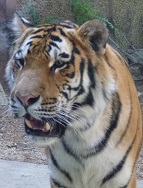Study wildlife conservation and contribute in valuable way!
Learn more about the rewarding and fascinating field of wildlife conservation.
This course covers various aspects of wildlife conservation including ecological processes, conservation of species and their habitat, genetic diversity of small populations, vertebrate zoology, ecological processes, surveying for wildlife, ornithology and marine studies.
Wildlife conservation may take many routes so it is important to have a holistic understanding of its many elements.
Course Structure and Content
Course duration: 600 hours of self-paced study.
CORE MODULES
The course is made up of six modules.
Click on the module titles below for further information on each.
There are four compulsory core modules -
Introduction To Ecology
Vertebrate Zoology
Wildlife Conservation
Environmental Assessment.
You then choose two electives from -
Herpetology
Primates
Marine Studies I
Ornithology
Animal Welfare
Note that each of the above modules can be completed as a standalone course.
Other options for elective modules may also be available. Please contact our school via phone or email to speak further about this.
How The Course Works
To complete the course, you are required to study six 100-hour modules.
There is an assignment at the end of each lesson. For example, in the Animal Behaviour module, there are eight lessons, so eight assignments.
At the end of each module, there is also an examination which you can take at a time and location to suit you.
To pass the course you are required to pass all assignments and six exams.
What makes wildlife susceptible?
 Wildlife is vulnerable to endangerment, decline and ultimately extinction, mainly because of human influence. However, there are a variety of other reasons and causes which can predispose a species to extinction. Some of these include:
Wildlife is vulnerable to endangerment, decline and ultimately extinction, mainly because of human influence. However, there are a variety of other reasons and causes which can predispose a species to extinction. Some of these include:
Rarity
Species can be considered “rare” if they are:
- Found in one specific type of environment or habitat,
- Found in only one particular area or locality, or
- Found at a very low density in a certain geographic location.
These characteristics will depend on each species geographic extent, the size of the habitat they live in and the amount of inhabitants in that particular area. Overall, rare species are considered more vulnerable to extinction than those which are more commonly found.
Ability to Disperse
Species that move in-between their habitats are generally less vulnerable to extinction than those who show limited abilities to disperse.
Degree of Specialisation
Species only able to become adapted to a single type of environment are generally more vulnerable to extinction. This is because they are “specialised” to only one type of resource (i.e., food, weather).
Population Variability
Species that have a more stable populations are more likely to survive as opposed to those which experience large, often cyclical fluctuations.
Trophic Level
Species occupying higher positions in the food chain will be more prone to extinction. This is because they rely on the presence of other species for food. Further, many of the species which they rely upon are likely to be 'shared' food sources with one or more other species.
Life Span
Species with a longer life expectancy are more prone to persist than those with shorter lifespan. This is because those who live longer experience more environmental changes, have longer to successfully reproduce and establish themselves throughout changing circumstances. Consider the elephant as opposed to the mouse.
Reproductive Rate
Species which have shorter gestational periods are less susceptible to extinction. Rapid reproduction is often coupled with high rates of reproduction. This means that species with faster reproductive cycles will be generally more able to re-establish population numbers in the face of changed, deleterious environmental circumstances.
Why Study with ACS?
Design your own learning pathway.
Study at your own pace, from anywhere, at any time.
Receive prompt, expert support from our team of committed and friendly tutors.
Your learning is our priority. We are flexible and adaptable to meet your educational needs!
Enrolling is easy - just go to the top of this page and select your study method and payment option.
If you have any questions about studying with ACS, or want to know more about any of our courses, get in touch with our specialist tutors today. They will be happy to answer your questions and look at different study options to fit in with your goals.